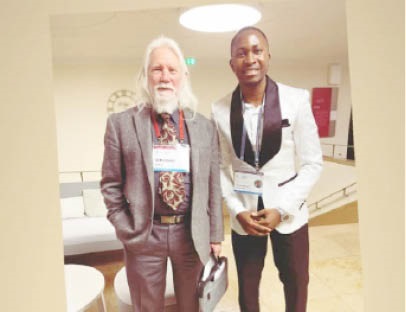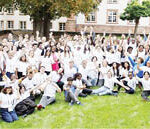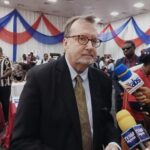Nigeria with 14 students has emerged in second position of countries with the highest number of mathematics and computer science best young researchers around the world in the 2022, 9th Heidelberg Laureate Forum (HLF), in Germany.
Nigeria is second to India with over 20 students selected in the fields of young researchers.
The HLF is annually organised by the Heidelberg Laureate Forum Foundation (HLFF) with hundreds of young researchers in mathematics and computer Science, dignitaries, including some of the world recognised mathematicians and computer scientists’ laureates in attendance.
World Literacy Day: Nigeria’s non-literate rate reduces from 38 to 31% — FG
‘Over 900 new non-formal education centers opened in North East’
The forum hosted about 200 young researchers from 50 countries. The young researchers will meet with the 25 laureates of the different recipients of the ACM A.M. Turing Award, Fields Medal, IMU Abacus Medal and Nevanlinna Prize, Abel Prize, and ACM Prize in Computing.
Also during the forum, the young researchers will connect with fellow scientists to encourage the future career of the young researcher, with extensive interaction with the laureates of mathematics and computer science to inspire the young minds to be the future laureates.
Speaking at the event, the chairperson of the HLFF and managing director of the Klaus Tschira Foundation, Beate Spiegel, stressed the importance of the scientific community, particularly in difficult times, to come together and pursue solutions to many of the world’s problems.
She expressed delight in seeing everyone back in Heidelberg in person after two years of remote digital events, adding, “Now is a time for everyone to know that all activities in the world have moved to the digital space.”
One of the Nigerian students’ best young researchers, Oluwatosin Babasola, a PhD student at University of Bath in the UK, expressed delight in being one of the 30 selected young researchers among the 200 to present their research in the presence of the Laureates and all invited participants.
Babasola, whose area of expertise is the general field of mathematics, said she is more inclined towards “applied mathematics.”

I am fortunate to have all my programmes to be funded through scholarship,” he said.
While noting that he has conducted multiple research projects in diverse areas such as numerical analysis, mathematical finance, infectious disease modeling, climate science and many more, he said he has also done several industrial based researches with mathematics team in the UK such as modeling the mismatch behaviour of bees, understanding the risk of COVID-19 transmission on trains and large events and others.
“My present research focuses on understanding the impact of climate change on agriculture where I mainly consider cocoa crops in Nigeria,” he said.
He noted that there are lots of benefits in doing research at a young age, adding, one of such benefits is that young researchers are often energetic and have less responsibility that could lead to distraction and also there are ample opportunities for them to explore different areas of their interest.
He however advised researchers to prepare for unforeseen circumstances because things don’t always go according to plans, which made his watchword: “Hope for the best but prepare for the worst.”
For those who want to have a career in scientific research, he said they should fuel the fire of curiosity and ask questions as ideas often come through interactions and their curiosity will motivate them towards pursuing such research.
“If you have a great idea, endeavour to communicate to colleagues of like minds and perhaps collaborate because as a popular adage, “Two heads are better than one,” he said.
Another Nigerian student, Osahon Jeffery Asowata of College of Medicine, University of Ibadan, who is a bio statistician, said he is beginning to learn how to use Artificial Intelligence for disease modeling.
“My current work is one CVD modeling for early detection of CVD outcome and risk factors,” he said.
He said doing research at a young age is beneficial as you are filled with vigor and strength, so doing research at this stage gives one the ability to think wide and give room for young minds to explore so many fields.
He however said it is not challenging working alone but it can limit one’s ideal and advised that collaboration helps to build one’s capacity.
For Dr Laeticia Nneka Onyejegbu, a lecturer in the Department of Computer Science, University of Port Harcourt, her area of expertise is in Artificial Intelligence, Intelligent Systems and Web Technology and her recent research activity is in Smart Agriculture, using AI and Internet of Things (IoT) to improve crop yields in Nigeria and Africa in general.
She also noted that as a young researcher, the benefit is that you have the zeal to work hard and succeed without much distraction, adding, “I expected having enough funds to carry out research and getting materials such as free internet connectivity, journal articles, and mentors abroad to guide me in my research.
“I and my research team have proposed to work on “Predictive model for cassava and maize crop yields for national food security and global production in Africa.” This work will help to prevent food scarcity and address food security. It will support the local economy and improve sustainable agricultural practices in Nigeria and Africa in general,” she said.
She however pointed out that she looks forward to seeing farmers grow their plants to their full potential, improve their crop yields, and enjoy abundant harvests by applying Internet of Things (IoT) and Artificial Intelligence (AI).
For aspiring researchers, she advised they collaborate in their work but that she does not find working alone as a challenge but that it is good to collaborate.
“I will love to encourage them and to let them know that there is nothing that they cannot achieve in terms of scientific research if they remain focused and determined,” she said.
Other Nigerian students for the award include Augustina Amakor, of Grenoble INP, University Frances, Abdulganiyu Jimoh, Mohammed VI Polytechnic University, Morocco, Oluwasesan Adewusi Chartered Institute of Forensics and Certified Fraud Examiners of Nigeria, Victor Amarachi Uzor, University of KwaZulu, Natal- South Africa, and Tolulope Anthonia Adebayo, Federal University of Technology, Akure, Nigeria.
Also, Grace Nnennaya Ogwo of University of KwaZulu Natal, South Africa, Chinwendu Emilian Madubueze, federal University of Agriculture, Makurdi, Benue, Christianah Titilope Oyewale, University of Ibadan, Tejumade Afonja, Saarland University, Germany, Joseph Damilola Akinyemi, University of Ibadan, Michaelangelo Francis-Alfred, Federal University of Technology, Akure and Julius Olaniyan, Land Mark University – Kwara.
Meanwhile, the Association for Computing Machinery (ACM), the Norwegian Academy of Science and Letters (DNVA) and the International Mathematical Union (IMU) are the two professional expert panels that do the selection based on merit and good ideas, one for mathematics, and one for computer science.
Hussaini Garba Mohammed, who is in Heidelberg, Germany

 Join Daily Trust WhatsApp Community For Quick Access To News and Happenings Around You.
Join Daily Trust WhatsApp Community For Quick Access To News and Happenings Around You.


